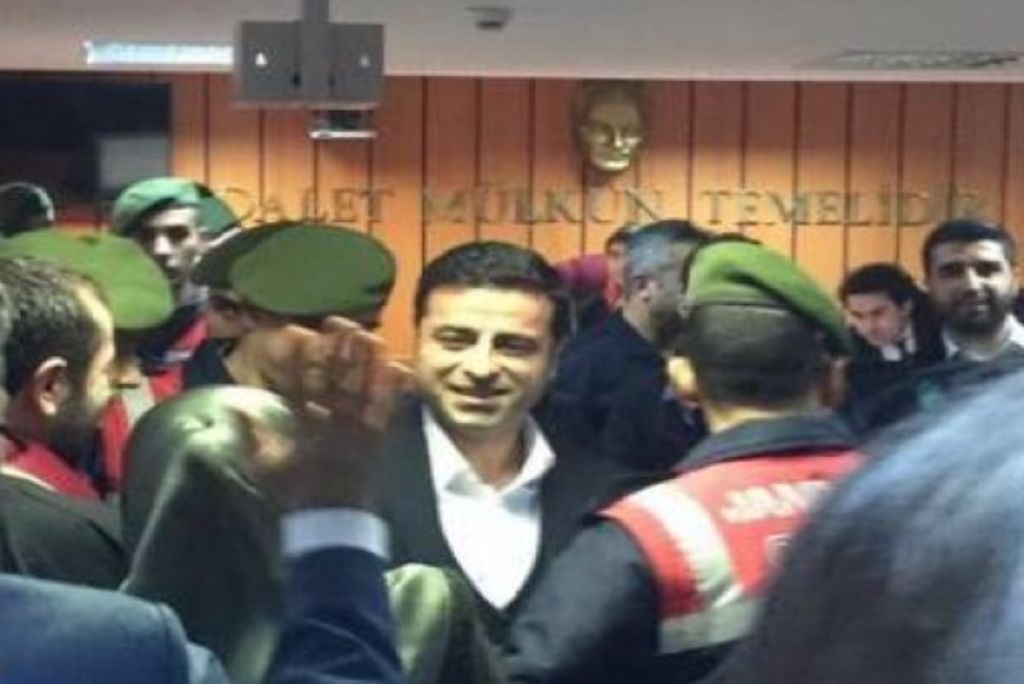Ankara 19th High Criminal Court within the Sincan Prison Campus has ruled on Friday for the continuation of Peoples’ Democratic Party (HDP) former Co-chair Selahattin Demirtaş’s imprisonment.
The court has ruled for the continuation of Demirtas’ arrest after the Kurdish political leader delivered his defense on the court against terrorism charges on 3rd day of his trial. Demirtaş has completed his defense on Friday and the prosecutor of the case demanded the continuation of his arrest. The judges followed prosecutors request and set the next hearing for April 11, 2018.
The hearing in the case of Demirtaş continued on its 3rd day at the courtroom within the Sincan Prison Campus in Ankara on Friday. Demirtaş is accused of being an administrator of the outlawed Kurdistan Workers’ Party (PKK) and being the head of its political section.
Demirtaş is also charged with “founding and running a terrorist organization,” making “terrorist propaganda” and “praising crimes and criminals.” He denies all the charges but faces up to 142 years in prison if convicted. The HDP, the third-largest party in the Turkish parliament, denies authorities’ accusations of links to the outlawed Kurdistan Workers’ Party (PKK). The suit initially filed in Diyarbakır province had been moved to Ankara for alleged security reasons.
Demirtas, who won votes beyond his Kurdish core constituency in recent elections, also faces up to four years in jail on the charges of insulting Turkish autocratic President Recep Tayyip Erdoğan. HDP has been hammered by a crackdown that followed an abortive coup in Turkey in July 2016. As many as 5,000 of party members have been detained, HDP says, while several of its lawmakers have also been stripped of their parliamentary status.
The third day of the hearing on Friday was followed by HDP deputies and about 50 lawyers. Demirtaş started his defence with a statement against the attempts to criminalize the Democratic Society Congress (DTK). Demirtaş stated that “The DTK is an absolutely legitimate institution. It is a structure that is comprised of NGO’s, academics and political parties. You cannot cite a single act of violence the DTK has committed to date. The only thing the DTK has done is to hold workshops and meetings. The parties that were thought impossible to come together have come together in the DTK. We sat around a table and discussed our ideas. The DTK is still active because it is not illegal. It is not a party to the violence, it is an alternative to it. That is how the DTK has self-organized. It is valued not just by us, but by various political parties and states.”
According to a report by pro-Kurdish Fırat news agency (ANF), Demirtaş has also spoken about some photographs taken in Qandil and İmralı during his defence on Friday and said that “We had our photographs taken in Qandil and İmralı. These were not souvenirs, they were photographs intended to show the gravity of the issue. We didn’t smuggle in a contraband camera. The photographs were taken by the officer there. They were given to us in digital format with the seal of the Ministry of Justice on them. And the photographs taken in Qandil were distributed with the approval of the government. Because these photographs were signs that the solution process was being handled seriously. Now that the ‘solution process’ has failed, these photographs become evidence in the case.”
Demirtaş has also said that “There is not a single speech or act that I can’t stand by.”
Turkish government has stepped up its crackdown on Kurdish politicians in recent years. Trustees have been appointed to dozens of municipalities in the country’s predominantly Kurdish Southeast, while hundreds of local Kurdish politicians have been arrested on terror charges. There are currently 11 HDP deputies behind bars. The developments have attracted widespread criticism from the region and Western countries.















